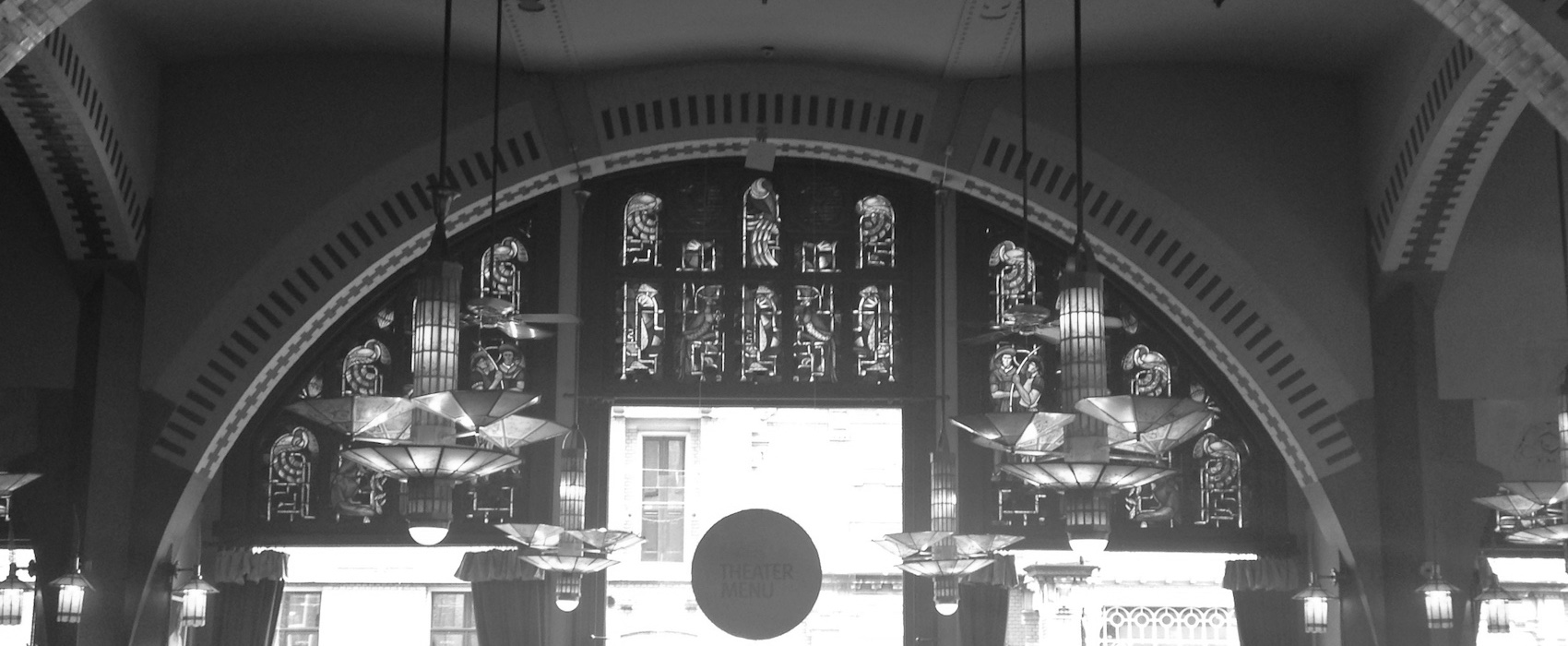Spending a day in Amsterdam I had the same sense of satisfaction I feel when I see a well-organised wardrobe in which everything has its place. In the cafés, the shopping streets, along the canals, it seemed that there is a place for everything too particularly the people, who move around one another comfortably. On the surface, there is little sign of the agitation, frustration, and irritation you encounter in London’s over-crowded streets, where it can feel like people are continually herded and have to jostle for space.
In Café Americain an ‘Interesting Faces’ series was published on the place mats – number 7 was about Dutch novelist Henry Mulisch who lived across the street from the hotel and on most days could be found working or reading the newspapers there. Before achieving widespread acclaim as a novelist, Mulisch worked hard to get his name known – waiters would enter the restaurant and call him to the telephone. It was rumoured that there were no callers, but the ruse did succeed in getting his name known. There was no such flamboyance on show in this grand cafe, or in the other cafes we went to during the day, instead, the atmosphere was relaxed, chatty.
It’s an interesting location to think about Simone Weil’s argument that order is a basic need of the human soul. I’ve only spent a day or so here, so my impressions can only be superficial ones, but everywhere I went there was this sense of order. Cyclists have their space, and there is no conflict with the motorists, no lorries that would crush them, so no one wears protective helmets. The trains seem spacious, and no one had to stand when we left on Amsterdam at what I imagine was during rush hour.
On a boat trip in which we were able to admire the beautiful city, Marijke told me about the impact of Protestantism on the Dutch psyche, how deeply values of justice, thrift, generosity had become part of the culture. It struck me that in England rather than being part of the national psyche, such values are perhaps traditionally associated with the middle class, while other strata of society, including the working class, immigrants, including Irish Catholics don’t quite fit that mould, but bring other characteristics and sensibilities.
Perhaps this begins to touch on my initial reactions to the question of order – the connotations with control and authoritarianism, my own fears about what has to be suppressed in order to conform to a particular code – minding your ps and qs and not breaking the fine china. Does this sense of ease, this apparent effortlessness and relaxed attitude towards life have its dark side, I wonder? To answer that, you would have to know more about the experience of ‘the other’ who live here, talk to the marginalised, the people who don’t fit, or struggle to. I didn’t, for instance, see many poor people, or people from different ethnic backgrounds, although I did notice at the airport that the cleaning staff were BAME.
But perhaps my resistance to the idea of order is not dissimilar to those implicit in ideas about creativity, the suggestion that it requires spontaneity, chaos and disorganisation. And it’s not even the case that Dutch people are conformist, when a banker was due to be paid a million euros, a Twitter storm stopped him. The cyclists stopped plans to close up the road running through the museum and there were protests over the opera house – Marijke laughed when the guide said that the Dutch took every opportunity to riot. She pointed out the university building where there have been protests since the 60s, including Occupy protests more recently.
It’s also a place of ideas and innovation – with a lot of thinking going on about education and in social care, where there is a focus on reducing levels of management and allowing care workers to be self organising. In this context, Simone Weil’s argument that people need order could be interpreted as a need, not for control, but for something that sets boundaries. Order seems as much about allowing space, not filling every bit of it, but holding back, and seeing what will flourish.

Leave a Reply
You must be logged in to post a comment.